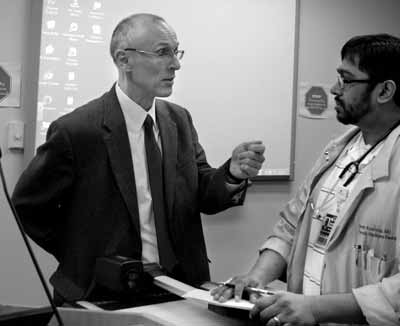Dr. Mladen Golubic spoke twice in Peoria recently, and each time his message was revolutionary. He’s an ardent proponent of a healthcare system based on disease prevention rather than the current, expensive healthcare system based on disease treatment. The current system is unaffordable, he said, with annual costs for just cardiovascular disease alone hitting $818 billion by 2030.

Dr. Mladen Golubic speaks with Dr. Amit Kashyap, resident in family medicine at University of Illinois College of Medicine, Unity Point Health-Methodist.
At both of his talks, Golubic presented research-based evidence to show disease reversal with a plant-based diet.
Golubic, M.D. and Ph.D., is medical director of the Cleveland Clinic Center for Disease Reversal. His formula for health doesn’t encompass expensive heart by-pass surgery, nutritional supplements or an array of pharmaceutical drugs. His prescription is a plant-based, whole-food diet with no-added oil and an exercise regime. That formula can eliminate 80 percent of coronary heart disease, annually saving $654.4 billion by 2030.
He was the featured speaker at the third session of “Cook Well, Eat Well, Live Well,” an ongoing series of lectures and cooking classes conceived by Dr. Jeffrey Leman and Dr. Keith Knapp and designed by Kathy Corso and Anne Patterson. The program is geared toward helping physicians and advance practice providers acquire more information about how food can be used to combat disease.
After dicing, slicing and discussing leafy greens, whole grains and pastured local chicken, about 30 physicians and medical professionals ate the meal they helped prepare in Illinois Central College’s culinary department kitchens. Golubic selected house-made tofu rather than chicken for his entrée.
He said that if all funding to the National Institutes of Health were eliminated, research already exists confirming how to prevent 80 percent of chronic disease.
Little scientific evidence shows pharmaceutical probiotics are any more effective than the probiotic support provided by a plant-based diet, he said.
In response to criticism leveled at the plant-based diet and best-selling books that support consumption of animal-based protein, Golubic confirmed the plant-based diet relies primarily on epidemiological studies rather than randomized control clinical trials.
“People talk about the scientific evidence being stronger to support a Mediterranean diet,” he said. “But epidemiological evidence is not flawed, it’s just weaker than a randomized study.”
It’s not possible to conduct a randomized study of women with breast cancer with one group treated through diet and one through medication and surgery, he said.
However, even without evidence from randomized control clinical trials, Golubic said research supports the effectiveness of dietary changes to prevent chronic disease. Concerning a possible link between casein, a protein in cow milk, and breast cancer, Golubic noted that laboratory research based on this hypoth esis is conducted on laboratory animals.
“When it comes to human cancer, the data is not as clear, but knowing that not a single nutrient in milk can’t be gotten from plants, there is no reason not to avoid milk,” he said, suggesting that the Komen pink ribbon be placed on kale, broccoli and Brussels sprouts rather than yogurt.
Golubic said he lays out the spectrum of dietary choices for his patients and tells them any movement toward the ideal plant-based diet is positive improvement. It is not an all-or-nothing requirement.
“If a patient moves from saturated fat to olive oil and moves from red meat and high fat toward vegetables, OK, that’s improvement but you can still do it better,” he said.
He and his wife are sometimes flexible about the diet with their own two young children.
“We make compromises,” he said, referring to an Oreo cookie on occasion.
But he was emphatic in stating “Absolutely, a vegan diet is OK for children.”
He also drew a distinction, seeing no great harm when women eat diets based on vegetables and legumes and occasionally eat yogurt compared with women who eat red meat and limited vegetables and consume dairy.
“We are looking at the whole diet, not one individual nutrient,” he said. “I tell my patients, here is the spectrum and here is the point I believe is best, but if you make any movement that’s good.”
Golubic is a colleague at Cleveland Clinic of Dr. Michael Roizen and Dr. Caldwell Esselstyn, both prominent advocates of a plant-based diet.
The American healthcare system is expensive and has comparatively poor outcomes. However, 75 percent of healthcare costs in this country are related to chronic diseases that are avoidable with lifestyle choices embracing diet, exercise and emotion, Golubic said.
“Chronic disease is one basic illness due to poor lifestyle choices,” he said.
Health is not totally determined by genes, Golubic said, noting that diet can modulate genes that cause and prevent disease.
“Diet changes the expression of genes,” he said, noting that leafy greens can help suppress bad outcomes.
Cardiovascular disease is expected to triple in cost from $273 billion in 2010 to $818 billion in 2030, making diet and lifestyle changes the best reasonable approach to maintaining health and preventing and reversing disease.
Since 2011, Medicare has covered some aspects of the Ornish lifestyle training for reversing cardiac disease. Medicare has not yet extended coverage to the Cleveland Clinic diet.
Golubic is a major advocate for nutrition education.
“If you make lifestyle changes, you change the self, the family and the community,” he said. “If you take a pill, you are not changing the family or the community.”
He concluded saying, “An alien would be perplexed (observing us because) we know so much about disease and prevention, yet we do so little.”
For more information on Golubic and the Cleveland Clinic Center for Lifestyle Medicine Wellness Institute, go to http://my.clevelandclinic.org/wellness/lifestyle-medicine/default.aspx
